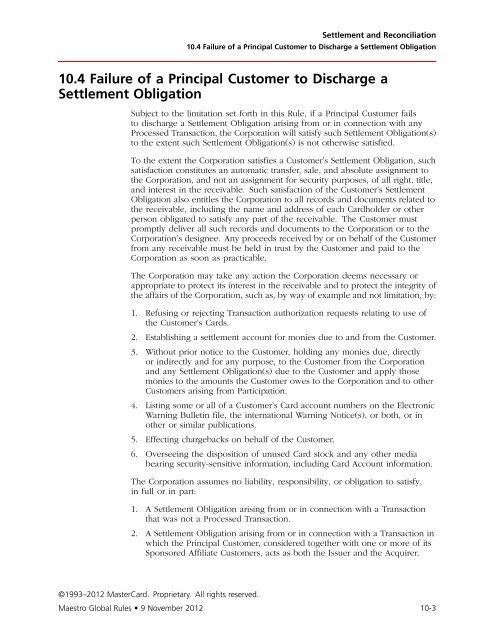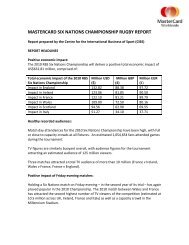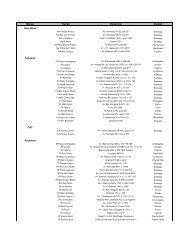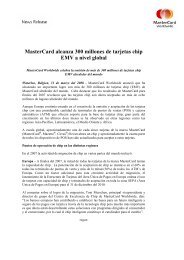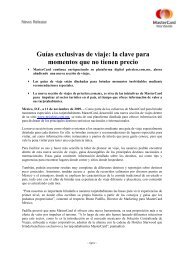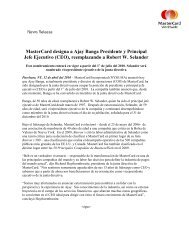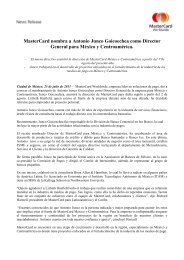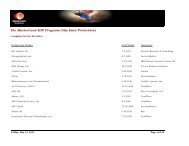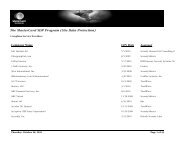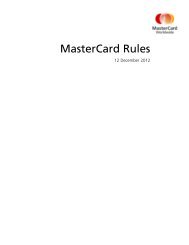- Page 1 and 2:
Maestro Global Rules 9 November 201
- Page 3 and 4:
Summary of Changes This document re
- Page 5 and 6:
Table of Contents Definitions .....
- Page 7 and 8:
Table of Contents 3.12 Contact Info
- Page 9 and 10:
Table of Contents 6.2.4 Mobile Paym
- Page 11 and 12:
Table of Contents 7.8 Eligible POI
- Page 13 and 14:
Table of Contents 8.6.1 Account Pro
- Page 15 and 16:
Table of Contents 9.9.3 Noncomplian
- Page 17 and 18:
Table of Contents 14.1 Service Prov
- Page 19 and 20:
Table of Contents 7.23 ATM Access F
- Page 21 and 22:
Table of Contents 2.3 Area of Use .
- Page 23 and 24:
Table of Contents 7.2 Additional Ac
- Page 25 and 26:
Table of Contents 9.15 Clearing and
- Page 27 and 28:
Table of Contents 6.4 PIN and Signa
- Page 29 and 30:
Table of Contents 6.4 PIN and Signa
- Page 31 and 32:
Table of Contents 7.1.8 Card Accept
- Page 33 and 34:
Table of Contents D.8.1 Corresponde
- Page 35 and 36:
Activity(ies) The undertaking of an
- Page 37 and 38:
Control As used herein, Control has
- Page 39 and 40:
Gateway Transaction Any ATM transac
- Page 41 and 42:
Maestro Word Mark The Maestro Word
- Page 43 and 44:
Payment Transaction A Payment Trans
- Page 45 and 46:
Settlement Obligation A financial o
- Page 47 and 48:
Chapter 1 Participation This chapte
- Page 49 and 50:
Participation 1.2 Eligibility to be
- Page 51 and 52:
Participation 1.2 Eligibility to be
- Page 53 and 54:
Participation 1.4 Interim Participa
- Page 55 and 56:
Participation 1.7 Termination of Li
- Page 57 and 58:
Participation 1.7 Termination of Li
- Page 59 and 60:
Chapter 2 Licensing and Licensed Ac
- Page 61 and 62:
Licensing and Licensed Activities 2
- Page 63 and 64:
Licensing and Licensed Activities 2
- Page 65 and 66:
Chapter 3 Customer Obligations This
- Page 67 and 68:
3.1 Standards Customer Obligations
- Page 69 and 70:
3.1.2.1.3 Category C—Efficiency a
- Page 71 and 72:
3.1.2.4 Review Process Customer Obl
- Page 73 and 74:
3.3 Choice of Laws Customer Obligat
- Page 75 and 76:
3.7 Provision and Use of Informatio
- Page 77 and 78:
3.7.3 Use of Corporation Informatio
- Page 79 and 80:
3.9.2 Photographs Customer Obligati
- Page 81 and 82:
3.11.2 Card Count Reporting Procedu
- Page 83 and 84:
Customer Obligations 3.18 Expenses
- Page 85 and 86:
3.22 Data Protection—Europe Regio
- Page 87 and 88:
4.1 Right to Use the Marks Marks 4.
- Page 89 and 90:
4.4 Review of Solicitations 4.5 Dis
- Page 91 and 92:
4.7.1 Global Minimum Branding Requi
- Page 93 and 94:
Chapter 5 Special Issuer Programs T
- Page 95 and 96:
Special Issuer Programs 5.1 Special
- Page 97 and 98:
Special Issuer Programs 5.2 Affinit
- Page 99 and 100:
Special Issuer Programs 5.4 A/CB Ca
- Page 101 and 102:
5.6.2 Categories of Prepaid Card Pr
- Page 103 and 104:
Special Issuer Programs 5.6 Prepaid
- Page 105 and 106:
Special Issuer Programs 5.7 Chip-on
- Page 107 and 108:
Issuing 6.4.2 Use of the PIN.......
- Page 109 and 110:
Issuing 6.2 Card Standards and Spec
- Page 111 and 112:
Issuing 6.2 Card Standards and Spec
- Page 113 and 114:
Issuing 6.2 Card Standards and Spec
- Page 115 and 116:
Issuing 6.2 Card Standards and Spec
- Page 117 and 118:
Issuing 6.2 Card Standards and Spec
- Page 119 and 120:
Issuing 6.4 PIN and Signature Requi
- Page 121 and 122:
Issuing 6.5 Transmitting, Processin
- Page 123 and 124:
Issuing 6.8 Mobile Remote Payment T
- Page 125 and 126:
Issuing 6.9 Electronic Commerce 6.9
- Page 127 and 128:
Issuing 6.11 MasterCard MoneySend P
- Page 129 and 130:
Issuing 6.14 Fraud Reporting 6.13.1
- Page 131 and 132:
Issuing 6.19 Recurring Payments—E
- Page 133 and 134:
Acquiring 7.2 Additional Acquirer O
- Page 135 and 136:
Acquiring 7.18.2.2 Disposition of C
- Page 137 and 138:
Acquiring 7.1 Acquirer Obligations
- Page 139 and 140:
Acquiring 7.1 Acquirer Obligations
- Page 141 and 142:
Acquiring 7.1 Acquirer Obligations
- Page 143 and 144:
Acquiring 7.1 Acquirer Obligations
- Page 145 and 146:
Acquiring 7.1 Acquirer Obligations
- Page 147 and 148:
Acquiring 7.1 Acquirer Obligations
- Page 149 and 150:
Acquiring 7.1 Acquirer Obligations
- Page 151 and 152:
Acquiring 7.1 Acquirer Obligations
- Page 153 and 154:
Acquiring 7.2 Additional Acquirer O
- Page 155 and 156:
Acquiring 7.3 Additional Acquirer O
- Page 157 and 158:
Acquiring 7.5 Acquiring Payment Tra
- Page 159 and 160:
Acquiring 7.6 Acquiring MoneySend P
- Page 161 and 162:
Acquiring 7.7 Acquiring Mobile Remo
- Page 163 and 164:
Acquiring 7.9 POS Terminal and Term
- Page 165 and 166:
Acquiring 7.9 POS Terminal and Term
- Page 167 and 168:
Acquiring 7.11 Additional Requireme
- Page 169 and 170:
Acquiring 7.12 Additional Requireme
- Page 171 and 172:
Acquiring 7.14 POI Terminal Transac
- Page 173 and 174:
Acquiring 7.15 Requirements for Tra
- Page 175 and 176:
Acquiring 7.16 POS Terminal and Ter
- Page 177 and 178:
Acquiring 7.17 Connection to the In
- Page 179 and 180:
Acquiring 7.18 Card Capture NOTE 7.
- Page 181 and 182:
Acquiring 7.20 Merchandise Transact
- Page 183 and 184:
Acquiring 7.23 ATM Access Fees 7.23
- Page 185 and 186:
Acquiring 7.23 ATM Access Fees 1. t
- Page 187 and 188:
Acquiring Compliance Zones Rule Num
- Page 189 and 190:
Security 8.10.4 Acquirer Compliance
- Page 191 and 192:
Security 8.3 Customer Compliance wi
- Page 193 and 194:
Security 8.5 PIN Entry Device Issue
- Page 195 and 196:
Security 8.6 POS Terminal Communica
- Page 197 and 198:
Security 8.9 Account Data Compromis
- Page 199 and 200:
Security 8.9 Account Data Compromis
- Page 201 and 202:
Security 8.9 Account Data Compromis
- Page 203 and 204:
Security 8.9 Account Data Compromis
- Page 205 and 206:
Security 8.9 Account Data Compromis
- Page 207 and 208:
Security 8.10 Site Data Protection
- Page 209 and 210: Security 8.10 Site Data Protection
- Page 211 and 212: Security 8.10 Site Data Protection
- Page 213 and 214: Security 8.10 Site Data Protection
- Page 215 and 216: Security 8.11 Algorithms 8.11 Algor
- Page 217 and 218: Chapter 9 Processing Requirements T
- Page 219 and 220: Processing Requirements 9.12 Floor
- Page 221 and 222: Processing Requirements 9.2 POS Tra
- Page 223 and 224: Processing Requirements 9.2 POS Tra
- Page 225 and 226: Processing Requirements 9.2 POS Tra
- Page 227 and 228: Processing Requirements 9.2 POS Tra
- Page 229 and 230: Processing Requirements 9.3 Termina
- Page 231 and 232: Processing Requirements 9.4 Special
- Page 233 and 234: Processing Requirements 9.4 Special
- Page 235 and 236: Processing Requirements 9.5 Process
- Page 237 and 238: Processing Requirements 9.7 Process
- Page 239 and 240: Processing Requirements 9.8 Authori
- Page 241 and 242: Processing Requirements 9.8 Authori
- Page 243 and 244: Processing Requirements 9.9 Perform
- Page 245 and 246: Processing Requirements 9.12 Floor
- Page 247 and 248: Processing Requirements 9.13 Ceilin
- Page 249 and 250: Processing Requirements 9.13 Ceilin
- Page 251 and 252: Processing Requirements 9.13 Ceilin
- Page 253 and 254: Processing Requirements 9.13 Ceilin
- Page 255 and 256: Processing Requirements 9.13 Ceilin
- Page 257 and 258: Processing Requirements 9.15 Cleari
- Page 259: 10.1 Definitions 10.2 Settlement Se
- Page 263 and 264: Settlement and Reconciliation 10.7
- Page 265 and 266: 10.8.2 Intraregional Fees Settlemen
- Page 267 and 268: The Customer must: Settlement and R
- Page 269 and 270: Content Relocated to Chargeback Gui
- Page 271 and 272: Content Relocated to Chargeback Gui
- Page 273 and 274: Liabilities and Indemnification 13.
- Page 275 and 276: 13.6 Proprietary Card Mark Liabilit
- Page 277 and 278: Liabilities and Indemnification 13.
- Page 279 and 280: Liabilities and Indemnification 13.
- Page 281 and 282: Chapter 14 Service Providers This c
- Page 283 and 284: 14.1 Service Provider Categories Se
- Page 285 and 286: 14.1.1 Independent Sales Organizati
- Page 287 and 288: Service Providers 14.3 General Obli
- Page 289 and 290: Service Providers 14.3 General Obli
- Page 291 and 292: 14.3.10 Fees Service Providers 14.3
- Page 293 and 294: 14.3.15 No Endorsement of the Corpo
- Page 295 and 296: 14.4.3 Access to Documentation Serv
- Page 297 and 298: Service Providers 14.6 Service Prov
- Page 299 and 300: Service Providers 14.8 Confidential
- Page 301 and 302: Chapter 15 Asia/Pacific Region This
- Page 303 and 304: Overview Definitions Asia/Pacific R
- Page 305 and 306: 1.7 Termination of License Asia/Pac
- Page 307 and 308: 6.13 Issuer Responsibilities to Car
- Page 309 and 310: Asia/Pacific Region 7.18 Card Captu
- Page 311 and 312:
Asia/Pacific Region 7.23 ATM Access
- Page 313 and 314:
Asia/Pacific Region 9.2 POS Transac
- Page 315 and 316:
Technical Specifications Compliance
- Page 317 and 318:
Canada Region 9.3.1 Issuer Requirem
- Page 319 and 320:
Canada Region 6.17 Additional Rules
- Page 321 and 322:
Canada Region 7.17 Connection to th
- Page 323 and 324:
Canada Region 7.23 ATM Access Fees
- Page 325 and 326:
Canada Region 9.8 Authorizations 9.
- Page 327 and 328:
Canada Region Section 16a—Canada
- Page 329 and 330:
Canada Region 7.1 Acquirer Obligati
- Page 331 and 332:
Chapter 17 Europe Region This chapt
- Page 333 and 334:
Europe Region 6.4.2.1 Chip Cards...
- Page 335 and 336:
Europe Region 8.4 PIN and Key Manag
- Page 337 and 338:
Europe Region Technical Specificati
- Page 339 and 340:
Overview Definitions Europe Region
- Page 341 and 342:
Europe Region 1.1 Types of Customer
- Page 343 and 344:
2.3 Area of Use Europe Region 2.3 A
- Page 345 and 346:
Europe Region 2.3 Area of Use In al
- Page 347 and 348:
The intra-European Maestro Rules, i
- Page 349 and 350:
3.4 Examination and Audits The foll
- Page 351 and 352:
3.22 Data Protection Europe Region
- Page 353 and 354:
Europe Region 4.2 Protection and Re
- Page 355 and 356:
Europe Region 5.1 Special Issuer Pr
- Page 357 and 358:
6.1 Eligibility Europe Region 6.1 E
- Page 359 and 360:
6.2.2 Embossing and Engraving Stand
- Page 361 and 362:
6.9 Electronic Commerce Europe Regi
- Page 363 and 364:
Croatia Malta Turkey Cyprus Moldova
- Page 365 and 366:
6.14 Fraud Reporting Europe Region
- Page 367 and 368:
Europe Region 6.19 Recurring Paymen
- Page 369 and 370:
7.1.5 Acquiring Transactions Europe
- Page 371 and 372:
Europe Region 7.3 Additional Acquir
- Page 373 and 374:
7.9.2 Manual Key-entry of PAN Europ
- Page 375 and 376:
Europe Region 7.12 Additional Requi
- Page 377 and 378:
Europe Region 7.13 Additional Requi
- Page 379 and 380:
Europe Region 7.15 Requirements for
- Page 381 and 382:
7.15.6 PAN Truncation Requirements
- Page 383 and 384:
7.23.1.1 Transaction Field Specific
- Page 385 and 386:
Europe Region 7.27 Identification o
- Page 387 and 388:
Europe Region 8.13 Signature-based
- Page 389 and 390:
Bosnia and Herzegovina Kosovo Slova
- Page 391 and 392:
Europe Region 9.2 POS Transaction T
- Page 393 and 394:
9.2.2.2 Optional Online POS Transac
- Page 395 and 396:
Europe Region 9.2 POS Transaction T
- Page 397 and 398:
9.3.2 Acquirer Requirements Europe
- Page 399 and 400:
Europe Region 9.4 Special Transacti
- Page 401 and 402:
Europe Region 9.4 Special Transacti
- Page 403 and 404:
9.4.7.4 CVC 2/AVS Checks Europe Reg
- Page 405 and 406:
Country Code Country Country Code C
- Page 407 and 408:
9.8.7 Authorization Response Time 9
- Page 409 and 410:
Europe Region 9.9 Performance Stand
- Page 411 and 412:
10.2.2 Assessment for Late Settleme
- Page 413 and 414:
Europe Region 10.11 Customer Insolv
- Page 415 and 416:
13.13 Additional Liabilities 13.13.
- Page 417 and 418:
Europe Region Compliance Zones Rule
- Page 419 and 420:
Definitions Europe Region Definitio
- Page 421 and 422:
7.9 POS Terminal and Terminal Requi
- Page 423 and 424:
9.4 Special Transaction Types Europ
- Page 425 and 426:
9.4.9 Internet Stored Value Wallets
- Page 427 and 428:
Europe Region 9.4 Special Transacti
- Page 429 and 430:
Europe Region 3.6 Non-discriminatio
- Page 431 and 432:
Europe Region 6.4 PIN and Signature
- Page 433 and 434:
Chapter 18 Latin America and the Ca
- Page 435 and 436:
Overview Definitions Latin America
- Page 437 and 438:
4.5 Display on Cards Latin America
- Page 439 and 440:
6.4.2 Use of the PIN Latin America
- Page 441 and 442:
Latin America and the Caribbean Reg
- Page 443 and 444:
Latin America and the Caribbean Reg
- Page 445 and 446:
9.2.2 Acquirer Online POS Transacti
- Page 447 and 448:
Latin America and the Caribbean Reg
- Page 449 and 450:
Chapter 19 South Asia/Middle East/A
- Page 451 and 452:
South Asia/Middle East/Africa Regio
- Page 453 and 454:
South Asia/Middle East/Africa Regio
- Page 455 and 456:
Chapter 20 United States Region Thi
- Page 457 and 458:
United States Region 7.25.7 Deposit
- Page 459 and 460:
United States Region 3.15 Integrity
- Page 461 and 462:
United States Region 6.2 Card Stand
- Page 463 and 464:
United States Region 6.10 Selective
- Page 465 and 466:
United States Region 6.17 Additiona
- Page 467 and 468:
United States Region 7.4 Acquiring
- Page 469 and 470:
United States Region 7.4 Acquiring
- Page 471 and 472:
United States Region 7.10 Hybrid PO
- Page 473 and 474:
United States Region 7.17 Connectio
- Page 475 and 476:
United States Region 7.23 ATM Acces
- Page 477 and 478:
United States Region 7.25 Shared De
- Page 479 and 480:
United States Region 7.25 Shared De
- Page 481 and 482:
United States Region 9.2 POS Transa
- Page 483 and 484:
United States Region 9.2 POS Transa
- Page 485 and 486:
United States Region 9.8 Authorizat
- Page 487 and 488:
United States Region 10.2 Settlemen
- Page 489 and 490:
United States Region Compliance Zon
- Page 491 and 492:
Overview Maestro PayPass Overview S
- Page 493 and 494:
7.1 Acquirer Obligations and Activi
- Page 495 and 496:
7.15 Requirements for Transaction R
- Page 497 and 498:
A.1 Asia/Pacific Region Geographica
- Page 499 and 500:
• Cyprus • Czech Republic • D
- Page 501 and 502:
• Estonia • Finland • France
- Page 503 and 504:
• Puerto Rico • St. Kitts-Nevis
- Page 505 and 506:
• Qatar • Reunion • Rwanda
- Page 507 and 508:
Maestro Merchant Operating Guidelin
- Page 509 and 510:
Maestro Merchant Operating Guidelin
- Page 511 and 512:
Signage, Screen, and Receipt Text D
- Page 513 and 514:
Signage, Screen, and Receipt Text D
- Page 515 and 516:
Signage, Screen, and Receipt Text D
- Page 517 and 518:
Signage, Screen, and Receipt Text D
- Page 519 and 520:
Signage, Screen, and Receipt Text D
- Page 521 and 522:
Signage, Screen, and Receipt Text D
- Page 523 and 524:
Signage, Screen, and Receipt Text D
- Page 525 and 526:
Signage, Screen, and Receipt Text D
- Page 527 and 528:
Signage, Screen, and Receipt Text D
- Page 529 and 530:
Signage, Screen, and Receipt Text D
- Page 531 and 532:
Signage, Screen, and Receipt Text D
- Page 533 and 534:
Signage, Screen, and Receipt Text D
- Page 535 and 536:
Signage, Screen, and Receipt Text D
- Page 537 and 538:
Signage, Screen, and Receipt Text D
- Page 539 and 540:
Signage, Screen, and Receipt Text D
- Page 541 and 542:
Signage, Screen, and Receipt Text D
- Page 543 and 544:
Signage, Screen, and Receipt Text D
- Page 545 and 546:
Signage, Screen, and Receipt Text D
- Page 547 and 548:
Signage, Screen, and Receipt Text D
- Page 549 and 550:
Signage, Screen, and Receipt Text D
- Page 551 and 552:
Signage, Screen, and Receipt Text D
- Page 553 and 554:
Signage, Screen, and Receipt Text D
- Page 555 and 556:
Signage, Screen, and Receipt Text D
- Page 557 and 558:
Signage, Screen, and Receipt Text D
- Page 559 and 560:
Glossary Glossary Glossary This sec
- Page 561 and 562:
usiness day Glossary Glossary A “
- Page 563 and 564:
data encryption standard (DES) Glos
- Page 565 and 566:
global bank holding company Glossar
- Page 567 and 568:
offline Glossary Glossary An operat
- Page 569 and 570:
PIN verification Glossary Glossary
- Page 571 and 572:
scrip Glossary Glossary A printed r
- Page 573 and 574:
terminal response time Glossary Glo


